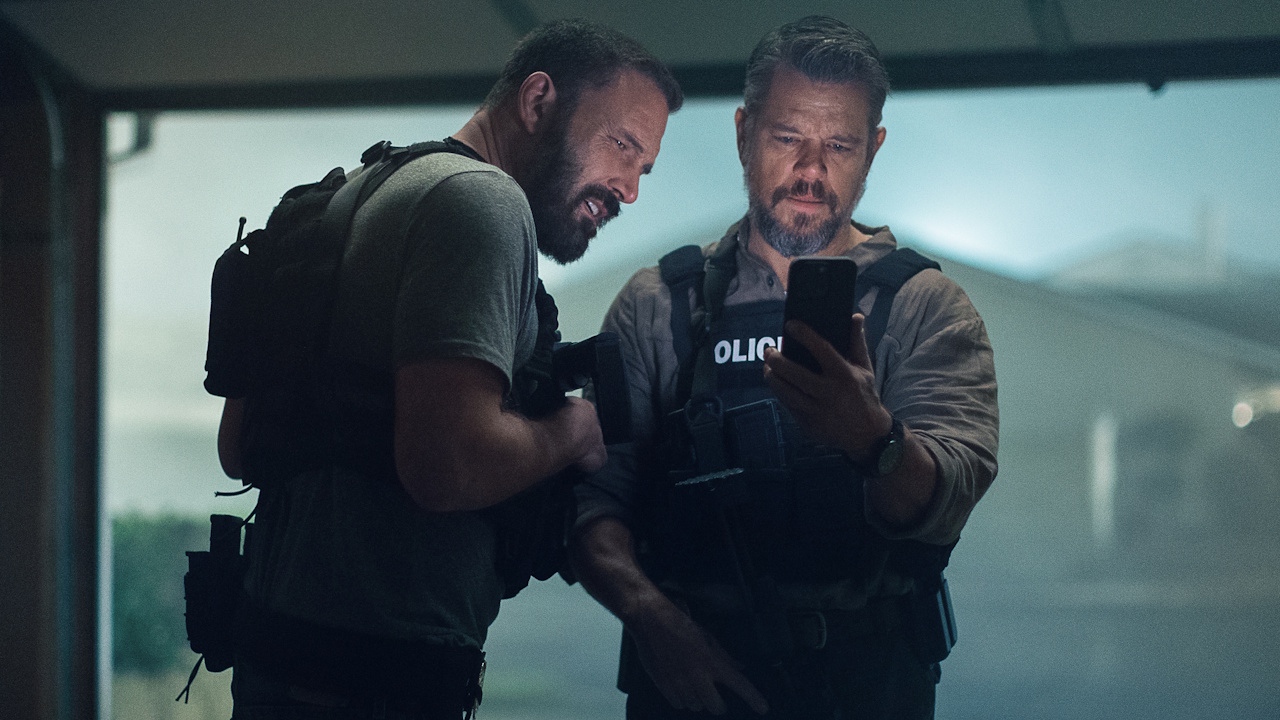7 Movies That Make Us Proud Of Democracy
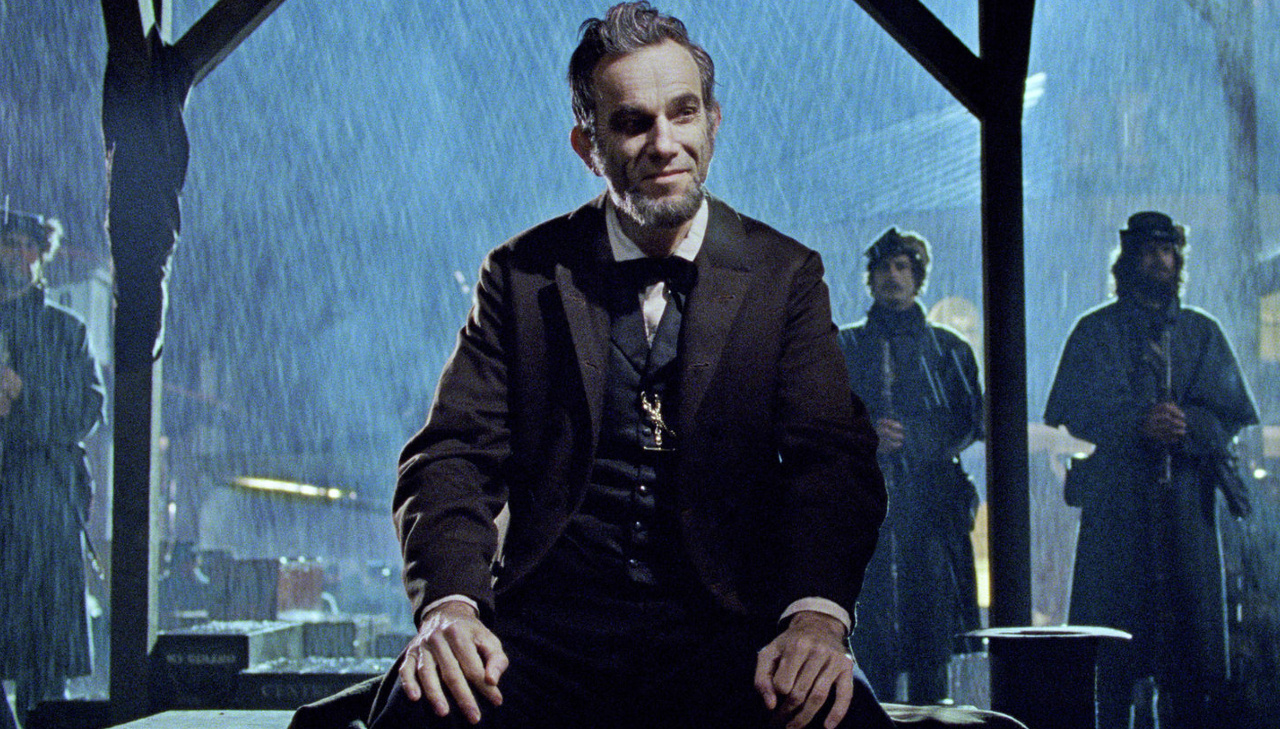
It has been said that democracy is the worst form of government, except for all the others that have been tried from time to time."-- Winston Churchill
Today here in the United States is the one day of the year that can make people well up with pride at the most basic aspects of how our country runs. It's Election Day, and even if you don't live in a swing state where your vote could determine who will become the President (hi, Ohio!) and even if you don't have a clue of who deserves your vote, you get the chance to step into a booth and make your choices among your elected officials. It's something that feels so standard and familiar these days, but when the country was first started 250 years ago, it was revolutionary.
So on a day when a lot of us are feeling especially proud to cast our votes, we decided to highlight some movies that can make you feel equally delighted with democracy, year-round. If you come home from your polling place today and want to keep that warm, fuzzy feeling going, one of these seven movies ought to do the trick.
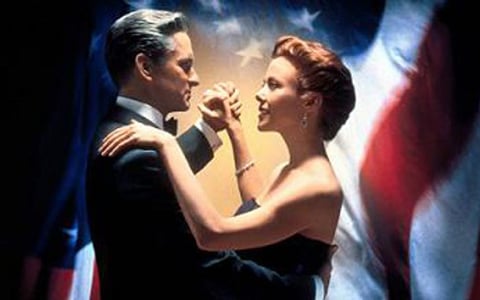
The American President
A lot of Aaron Sorkin’s work makes you want to rush to the booth and cast your vote. Whether it's on television (The West Wing) or demanding the truth even when you can’t handle it on the stage and screen (A Few Good Men), his career is full of political stories and characters that are almost annoyingly patriotic. Boy do they love to pontificate! And while most of the tales scream ‘USA!,’ one of the quieter demonstrations of Sorkin’s love of country is a romantic comedy where one person in the blossoming couple just happens to be The American President.
Okay, so it’s obviously still a very political film, but framing all the rhetoric around the romance makes the democratic cheerleading seem at least a little bit less in your face although no less effective. Directed by Rob Reiner, Sorkin’s 1995 film follows Michael Douglas’ widowed, single-father Commander in Chief losing favor with the public as he starts dating environmental lobbyist Annette Bening. It’s a great look at the nation’s need to know everything about their leader’s personal lives instead of just caring about how well they do their job. It’s also an interesting look behind the Washington spin scene and the final speech is Sorkin at his most inspiring; “My name is Andrew Shepherd and I am the President.”
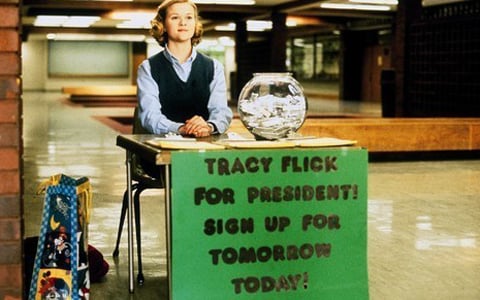
Election
Your Daily Blend of Entertainment News
Anyone who has seen Alexander Payne’s Election knows that Tracy Flick, the character played by Reese Witherspoon, is an awful, evil spawn from Satan and the fact that she’s ever put in any kind of position of power may prove that there is no god. But there is something very special and positive about the movie she’s in. From the outside the film may seem cynical and contemptuous of the electoral process, but in a strange way it also demonstrates that the system actually works.
It may be a controversial opinion, but Tracy is actually the only student in the high school election who should actually be running for the position, and somewhat deservedly wins. While she certainly isn’t without sin herself, her main opponent, the rube Paul Metzler (Chris Klein), is only in the race because Mr. McAllister (Matthew Broderick) convinced him to do it – he has no actual interest in being president. Likewise, Tammy Metzler (Jessica Campbell) only runs to spite her brother and ex-girlfriend. Despite these false candidates, Tracy still wins in the end – as the one true candidate – and even when Mr. McAllister makes an attempt at voter fraud his crime is uncovered. Election shows that the system is ultimately corruptible, but at the end democracy wins out.
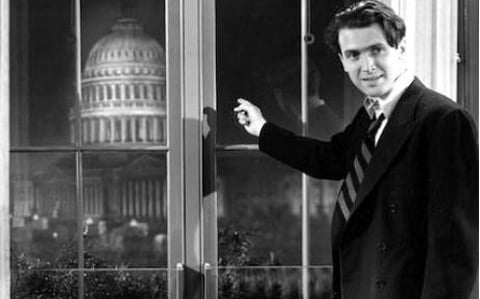
Mr. Smith Goes To Washington
At its core, this Frank Capra classic is about government corruption wherein one crooked senator wrangles a newly appointed colleague to do his bidding. But though he is new to the game of federal politics, Mr. Jefferson Smith (Jimmy Stewart in one of his most iconic turns) is no simple stooge; he is a noble man looking to use this opportunity to make America the best it can be. He's initially in awe of the Capitol Dome and the great men who have come before him, but when he realizes he's being manipulated, he takes to the floor of the Senate, filibustering for 24 hours straight to postpone a duplicitous bill.
But this isn't another American tale of one man making all the difference. Instead, Smith's success in the end is shared with his Gal Friday, the politically savvy and formerly cynical secretary Saunders (Jean Arthur), and a network of noble boy scouts who print an independent paper to spread the words of Smith. Ultimately, Mr. Smith Goes to Washington is about the people and their politicians pulling together to do what's best for our nation. And while its style is vintage, its message is as inspiring as ever.
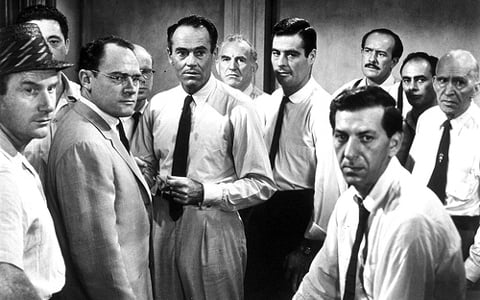
12 Angry Men
Jury duty seems like a drag but Sidney Lumet's 1957 film 12 Angry Men puts our civic responsibility into perspective in a way that's entertaining and inspiring. The film takes place almost entirely in a jury room where 12 men are convening to determined the fate of an 18-year-old Mexican-American kid who has been accused of murdering his father. Like the average person who may consider jury duty to be an intrusion on their usual routine, most of the jurors are eager to come to a quick verdict so that they can get back to their lives.
But one man, played by Henry Fonda, encourages them to question the findings of the case, because the life of a man is in their hands and they have an opportunity and responsibility to put some thought into their decision. It's easy to get caught up in the case being explored by the jurors, as they bicker and discuss the case and the time that's being spent or wasted mulling over the details, but at its heart, 12 Angry Men is a celebration of democracy and American civic responsibility.
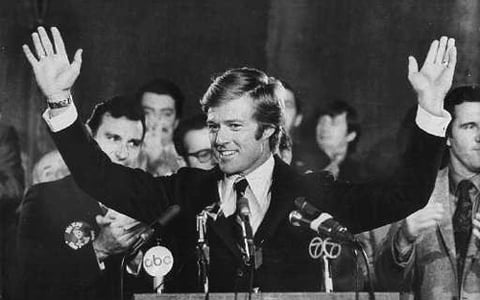
The Candidate
All we’re looking for every electoral season is a no-nonsense candidate we can support wholeheartedly, and without reservation. Today’s divisive political campaigns often prevent that from happening, though, as Super PACs spend billions to highlight an opponent’s flaws. Which is why we keep flashing back to Robert Redford’s idealistic Bill McKay, an underdog who runs for a Senate seat in Michael Ritchie’s satirical The Candidate.
An Oscar winner for its cynical but probing screenplay, The Candidate unleashes the likable Redford as a campaigning politician told he can spread his beliefs because he has no shot at unseating the incumbent Republican senator. Faced with a vicious, dishonest, advertising-heavy campaign cycle, McKay does his absolute best to speak honestly and slice through the bullshit, lobbying for – in his own words – “our faith in ourselves, and our faith in our country.” And it works. Watching The Candidate in action, one wonders why more politicians don’t rely on honesty when making promises to potential voters. As McKay teaches us with his campaign slogan, it’s “The Better Way.”
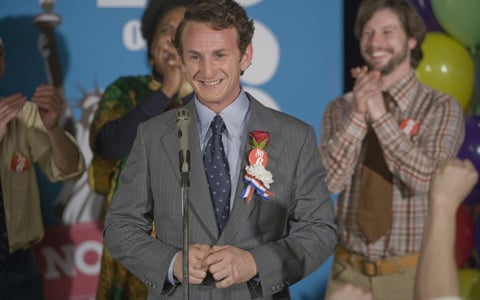
Milk
Can a single politician change the world? It's a question we ask even about our Presidents, since the even the most powerful men sometimes have a hard time dealing with their own Congresses or other countries to effect actual change. But one of history's most influential politicians also had one of the smallest jobs. Harvey Milk served just 11 months on the San Francisco Board of Supervisors but managed to pass groundbreaking gay rights laws in that time-- and after his assassination, became one of the most potent symbols of the struggle for gay rights.
As played by Sean Penn in the 2008 biopic, Harvey Milk is a full-fledged human, making mistakes in his love life and sometimes letting his temper get the best him, but also sticking firmly to his beliefs and helping other people believe in him too. Realizing that someone as lowly as a Supervisor in a single city could spark a civil rights movement that continues to this day, watching Milk might make you pay more attention to some of the down ticket candidates on your ballot, or even consider running yourself. Taking part in your local government could make you a hero, too.
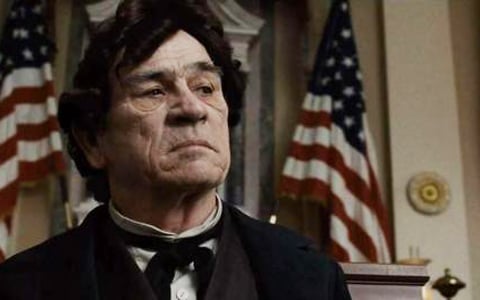
Lincoln
Though, as the title suggests, Steven Spielberg's Lincoln is largely about the 16th President and the difficult executive decisions he made, the film's highlights take place in the last place you'd think of as high-minded or revered: the floor of House of Representatives. Turns out it was an even more chaotic place back in the 1860s, crammed with men in wigs shouting at each other and calling each other names, half of them convinced that slavery should be legal forever, and all of them completely horrified by the idea of voting rights for women.
But watching all that shouting and nonsense, you might feel a swell of pride, watching democracy-- ugly and ridiculous as it is-- at work, before the country was even a century old. During Lincoln's presidency and the Civil War it was a very real concern that America wouldn't make it very long in their crazy experiment of giving every citizen a vote and doing away with dictators. Lincoln reminds you just how fragile the union was, but the scenes in the House are powerful reminders of why democracy works-- everyone wants their voice heard, and they'll shout if they have to.
Staff Writer at CinemaBlend

